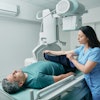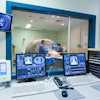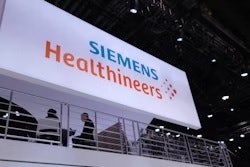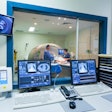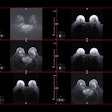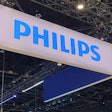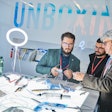VIENNA – A new 1.5-tesla MRI scanner with very low helium requirements took center stage for Siemens Healthineers at ECR 2024.
Making use of the vendor’s DryCool technology, Magnetom Flow is a “virtually” helium-free system; the scanner includes a closed helium circuit and no quench pipe. As a result, Flow requires only 0.7 liters of helium for cooling. Previous Siemens MRI scanners required up to 1,500 liters of helium, according to the firm.
Magnetom Flow has a bore size of 60 cm and also incorporates Siemens' DeepResolve AI-based image reconstruction software. DeepResolve enables image quality to be doubled while cutting exam times in half, according to Siemens.
 Felix Mueller-Witt, global head of product marketing for MRI at Siemens Healthineers, presents the vendor's new Magnetom Flow 1.5-tesla scanner at ECR 2024.
Felix Mueller-Witt, global head of product marketing for MRI at Siemens Healthineers, presents the vendor's new Magnetom Flow 1.5-tesla scanner at ECR 2024.
Siemens has also integrated several workflow automation capabilities. The firm’s MyExam Autopilot application can be used for routine exams, while its MyExam Assist software can offer guidance and automation on advanced studies. In addition, technologists can now also perform all workflow steps – registration, positioning, and initiating the scan – while being next to the patients.
In keeping with the vendor’s recent focus on sustainability, Flow includes an improved Eco Gradient mode, which automatically switches off energy-intensive components when they’re not needed, Siemens said. What’s more, the combination of helium-free technology with a new Eco Power Mode can yield 30% savings in overnight cooling capacity, according to Siemens.
Flow can fit into smaller spaces; the system is less than two meters in height and has a total footprint of 24 square meters; previous Siemens systems required 30 square meters. What’s more, the scanner weighs 3.7 tons, down from the 4.5 tons required for previous models, according to the firm.
Siemens is also highlighting Flow's use of flexible Contour BioMatrix coils, which include sensors that enable the scanner to automatically position them on the patient.
Siemens anticipates that Flow will receive the CE Mark in May. The vendor also plans to submit the scanner for U.S. Food and Drug Administration (FDA) clearance later his year. Siemens does anticipate that the 60-cm bore scanner will be of particular interest in other markets such as Europe, Asia, and Latin America, however.
In other ECR 2024 developments, Siemens also highlighted two systems that were first introduced at RSNA 2023, including its Acuson Maple midrange ultrasound system and its Somatom Pro.Pulse dual-source CT scanner.
In addition, company executives previewed the firm’s efforts to develop new software that utilizes generative AI technology and also shared more details on the vendor’s sustainability initiative. Siemens has committed to achieving a zero carbon footprint by 2050, with milestones along the way.
Notably, Siemens has also introduced Minitom Kids, a learning device designed to help kids between the ages of 3 and 7 be less stressed about receiving a CT or MRI exam. The goal is to decrease the need for sedation in this patient population, according to the firm.
 Minitom Kids is an educational tool for helping pediatric CT or MRI exams be less stressful for kids.
Minitom Kids is an educational tool for helping pediatric CT or MRI exams be less stressful for kids.
Minitom Kids includes a movable table and a tunnel under the scanner that children can use to practice lying still in the bore.
For more coverage from ECR 2024, please visit our RADCast.
